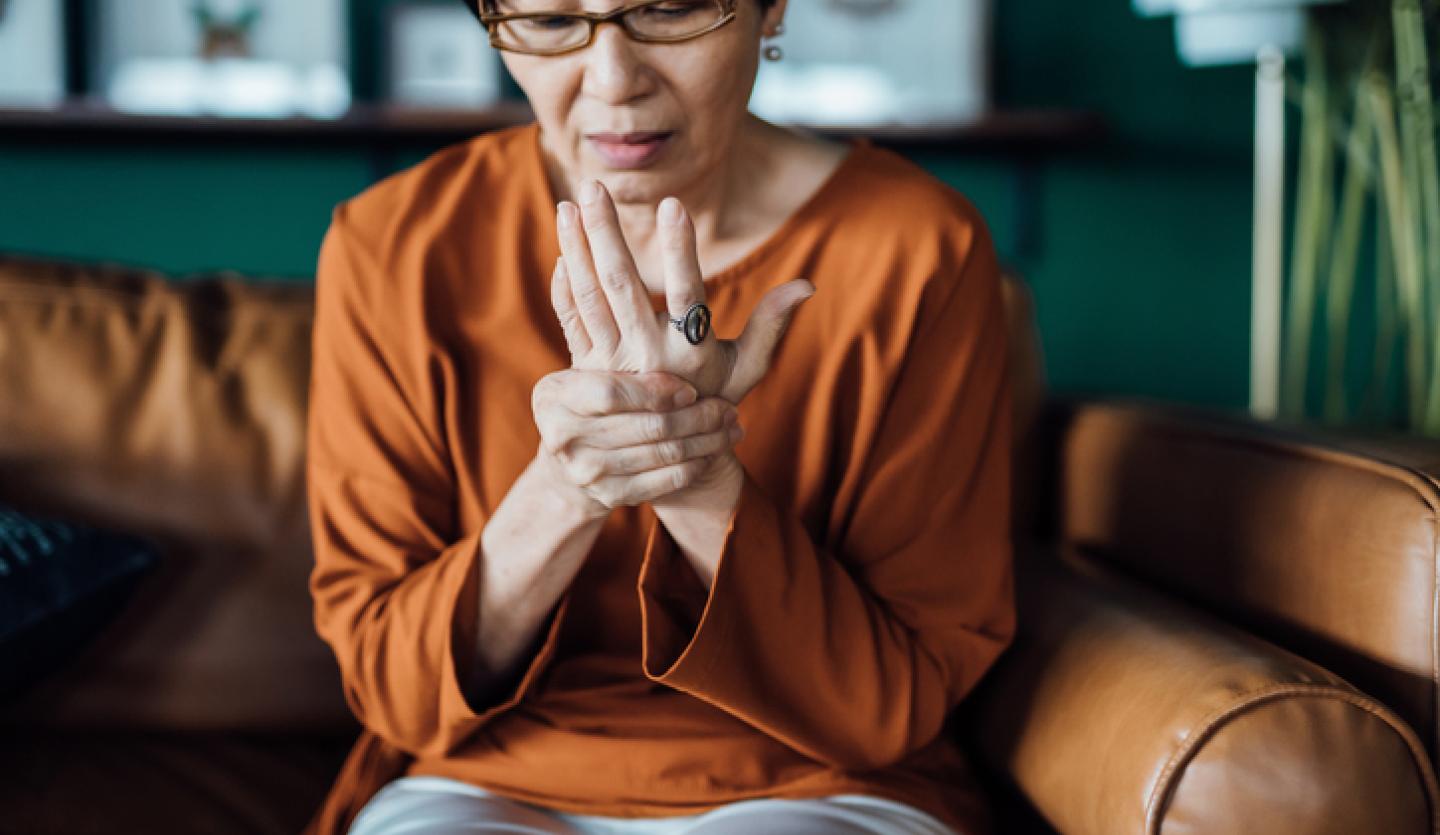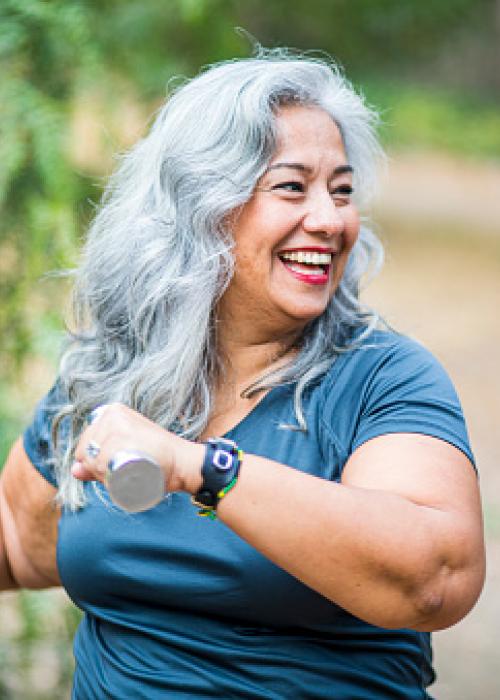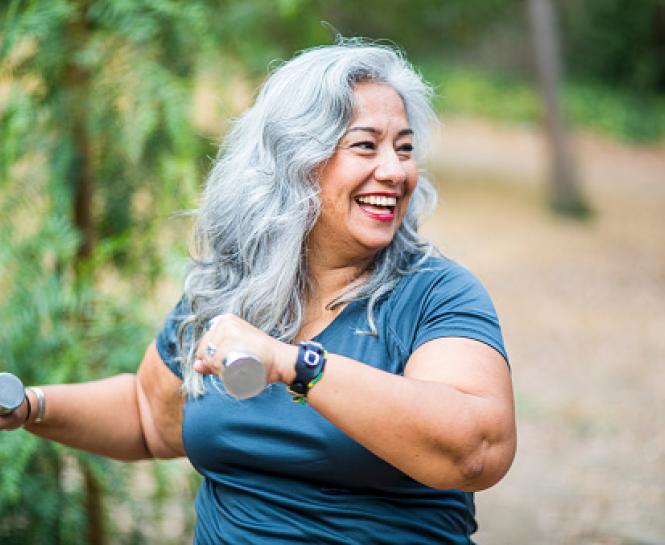Arthritis is a general condition that affects the health of your joints and surrounding tissue. Inflammatory arthritis is a specific group of arthritis. This condition causes pain and swelling in the affected joints. The most common types of inflammatory arthritis are:
- Rheumatoid arthritis (long-term disease affecting the joints)
- Ankylosing spondylitis (affecting the joints and ligaments of the spine)
- Gout (commonly causes pain and swelling in the foot or toe but can also affect other joints)
- Psoriatic arthritis (related to the skin condition psoriasis)
- Systemic lupus erythematosus (damages joints and organs)
“Pain from inflammatory arthritis makes it difficult to do everyday activities,” said Jeremy Loloi, MD. “Knowing what causes inflammatory arthritis and recognizing the symptoms can help you talk to your doctor so you can get diagnosed and treated.”
What causes inflammatory arthritis?
Inflammatory arthritis results from a problem with your immune system. That issue triggers the immune system to release chemicals that cause unnecessary swelling. These chemicals attack your joints and produce:
- Bone and cartilage damage
- Joint damage
- Muscle loss
- Nerve problems
Over time, this damage leads to wear and tear and related pain throughout the body.
What are the symptoms of inflammatory arthritis?
Joint-related symptoms of inflammatory arthritis may include:
- Inflammation (swelling)
- Joint pain and stiffness
- Stiffness in the morning
- Warmth and tenderness in the joint
Because inflammatory arthritis can cause swelling throughout the body, you may also experience other symptoms, including:
- Skin rashes
- Eye inflammation
- Hair loss
- Dry mouth
- Fever
How is inflammatory arthritis diagnosed?
“Your doctor will start with a physical exam, discuss the frequency and severity of your symptoms, and review your medical history,” said Dr. Loloi.
One or more of the following tests can help diagnose inflammatory arthritis:
- Blood test to evaluate levels of different blood cells and substances.
- Genetic test to determine specific markers related to inflammatory arthritis.
- Imaging tests like MRIs, X-rays, ultrasounds or CT scans can show areas with joint inflammation and damage.
What are the treatment options for inflammatory arthritis?
“Lifestyle changes are a good place to start,” said Dr. Loloi. “That includes a well-balanced diet rich in nutrients, getting the recommended amount of sleep, and reducing stress. All are vital in managing inflammatory arthritis and maintaining good overall health.”
In addition to lifestyle changes, your doctor may also recommend one or a combination of the following treatment options:
Medications
Prescription and over-the-counter medications can treat inflammatory arthritis. Depending on the type and severity of your symptoms, your doctor may recommend nonsteroidal anti-inflammatory drugs (NSAIDs), steroid injections or medications that target the immune system.
Physical or occupational therapy
A physical therapist can help you improve your range of motion, muscle strength and flexibility. Stronger muscles can help support your joints, reducing your pain. If inflammatory arthritis affects your hands, you may work with a specialty-trained hand therapist.
An occupational therapist can help you learn how to do everyday activities with less discomfort. Depending on your needs, they may suggest assistive devices to help make your daily life easier. These devices may include raised toilet seats, canes or adaptations for driving a car.
Exercise and staying active
“If you have inflammatory arthritis pain, you may feel like moving as little as possible,” said Dr. Loloi. “However, not moving your muscles and joints could worsen the condition. Instead, try gentle movements and exercise to reduce your inflammatory arthritis pain.”
Speak with your doctor before starting any exercise program. They may recommend the following types of exercises for inflammatory arthritis:
- At-home weightlifting. To do arm lifts, hold a 5-lb. dumbbell in each hand. If you do not have weights, hold a soup can in each hand. As you get stronger, increase the weight and number of reps.
- Cardiovascular exercise. Walk around your block, hike a trail at a local park or join a water aerobics class at a local fitness club.
- Pilates. You can check out a local Pilates studio or watch a beginner’s Pilates video online. This workout focuses on strengthening your core muscles, which support the rest of your body.
- Sit and stand. Start by sitting in a chair and then getting up using only your legs' muscles. Sit back down again. Repeat, and gradually rise more slowly to work your muscles more.
- Stretching. Focus on deep stretching and strengthening.
Dr. Loloi recommends getting in small bursts of movement throughout the day. “If you work a desk job or sit much of the time, set yourself a timer to get up and lightly stretch every hour or so,” he said. “Keeping your body moving can help reduce and manage inflammatory arthritis pain.”
Acupuncture
Research shows acupuncture can help lessen muscle tension and stress. During this treatment, a licensed acupuncturist inserts very thin needles into targeted points in the body.
Meditation
Meditation helps reduce stress and the effects of inflammation on the body. During meditation, a person practices deep, controlled breathing and pays close attention to their body and sensations in the world around them.
Surgery
When the arthritis is too advanced and non-surgical treatments are not effective, your doctor will discuss minimally invasive joint replacement surgery as an option.
“The good news with inflammatory arthritis is the number of treatment options available you can explore with your doctor,” said Dr. Loloi. “Finding the right solution can give you a pain-free life.”







